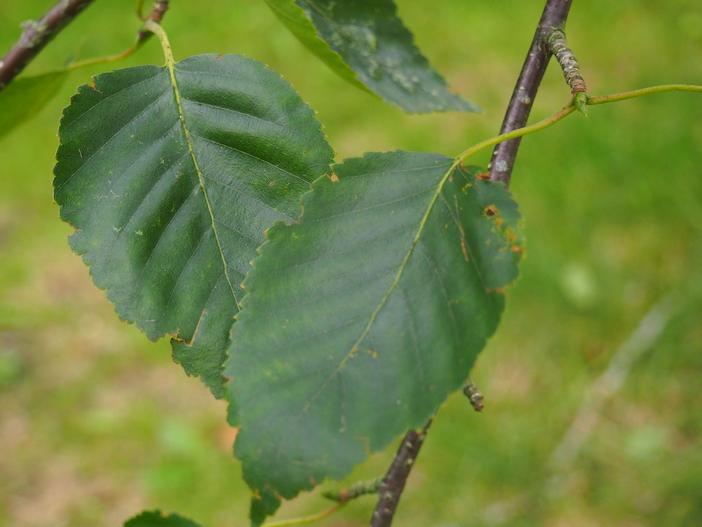West Himalayan Birch
(Betula jacquemontii)
West Himalayan Birch (Betula jacquemontii)
/
/

Teresa Grau Ros
CC BY-SA 2.0
Image By:
Teresa Grau Ros
Recorded By:
Copyright:
CC BY-SA 2.0
Copyright Notice:
Photo by: Teresa Grau Ros | License Type: CC BY-SA 2.0 | License URL: https://creativecommons.org/licenses/by-sa/2.0/ | Uploader: tgrauros | Publisher: Flickr



















Estimated Native Range
Summary
Betula jacquemontii, commonly known as West Himalayan Birch, is a deciduous tree native to montane and subalpine zones in the Himalayas, specifically in Central and South Asia. It typically grows to a height of 30-40 feet (9-12 meters) and a width of 18-25 feet (5-8 meters). This species is renowned for its striking white bark, which peels off in papery sheets, providing year-round visual interest. The leaves are ovate to triangular, and the tree produces catkins that are not particularly showy. Flowering occurs in spring, followed by the production of small winged seeds.
West Himalayan Birch is valued for its ornamental bark, which stands out in garden settings, especially in winter landscapes. It is often used in urban planting, as a specimen tree, and for creating contrast in border plantings. This birch prefers cool, moist conditions and can tolerate a range of soil types, though it thrives in well-drained, loamy soils. It requires full sun to part shade to flourish. While generally low-maintenance, it can be susceptible to birch borer and leaf spot diseases. Gardeners should be aware of these potential issues and monitor the tree’s health regularly.CC BY-SA 4.0
West Himalayan Birch is valued for its ornamental bark, which stands out in garden settings, especially in winter landscapes. It is often used in urban planting, as a specimen tree, and for creating contrast in border plantings. This birch prefers cool, moist conditions and can tolerate a range of soil types, though it thrives in well-drained, loamy soils. It requires full sun to part shade to flourish. While generally low-maintenance, it can be susceptible to birch borer and leaf spot diseases. Gardeners should be aware of these potential issues and monitor the tree’s health regularly.CC BY-SA 4.0
Plant Description
- Plant Type: Tree
- Height: 30-40 feet
- Width: 18-25 feet
- Growth Rate: Moderate
- Flower Color: N/A
- Flowering Season: Spring
- Leaf Retention: Deciduous
Growth Requirements
- Sun: Full Sun, Part Shade
- Water: Medium, High
- Drainage: Medium
Common Uses
Bank Stabilization, Bee Garden, Bird Garden, Butterfly Garden, Deer Resistant, Fragrant, Rabbit Resistant, Street Planting
Natural Habitat
Montane and subalpine zones in the Himalayas
Other Names
Common Names: Himalayan Birch, Himalayabjörk
Scientific Names: , Betula jacquemontii, Betula utilis var. jacquemontii, Betula utilis subsp. jacquemontii, Betula bhojpattra var. glandulifera, Betula bhojpattra var. jacquemontii, Betula utilis subsp. intermedia,
GBIF Accepted Name: Betula utilis subsp. jacquemontii (Spach) Kitam.